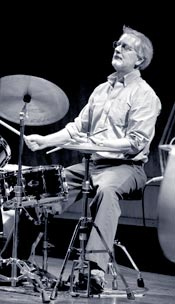 Mark Terry, a long time Teacher Advisor to UCMP, is the recipient of the 2011 Evolution Education Award, an annual award sponsored by AIBS and BSCS.
Mark Terry, a long time Teacher Advisor to UCMP, is the recipient of the 2011 Evolution Education Award, an annual award sponsored by AIBS and BSCS.
Mark is a high school Biology teacher at The Northwest School in Seattle. I first met Mark in 2000 when he sent an email inquiring about a conference that we were hosting — The National Conference on the Teaching of Evolution. The conference served to bring together members from professional societies to examine what their roles might be in supporting the teaching of evolution. Mark felt that he could gain much from such a meeting of the minds, but we probably gained more from Mark than the other way around. It became clear to us that there were a core number of teachers who were doing an excellent job of teaching evolution and that bringing them together to develop a resource for others would be an excellent contribution to the science education community. This served to initiate conversations that eventually led to a successful NSF proposal and the development of the Understanding Evolution (UE) website.
Mark officially became part of the UCMP community by serving as a Teacher Advisor to the UE project in 2002. As such, he attended meetings with other advisors, advised on the basic content of the site, contributed successful activities, and reviewed materials as they became available. Though there was a small honorarium involved, Mark gave of himself way beyond what was asked of him. Knowing how effective he was in this advisory role, it was not long before he was invited to also serve as an advisor to two of our other related projects: The Paleontology Portal and Understanding Science.
So what makes him special? First, it is that passion for teaching. I visited his school and watching him “in action” was extraordinary. He has the confidence that comes with depth of knowledge and experience, the flexibility that comes from years in the classroom, and a wonderful ability to urge his students to find out the answers on their own in a way that inspires their own confidence that they will be successful in doing so … eventually! With an avid interest in history, Mark also integrates the history of science into his teaching so that his students can see how science itself evolves with new data and new evidence, thus giving them a better understanding of how science works. And his classroom is full of skulls and other skeletal parts that support a comparative anatomy approach to studying ancestry and detailed observations through the biological illustration that he encourages.
Second, it is his passion for science. Mark literally gobbles up the paleo and evo literature, so he is on top of current research and brings his excitement of new discoveries into the classroom. That same excitement is extended into the field as he takes his students on paleo field trips to John Day Fossil Beds National Monument each year and he also serves as a field assistant to his daughter, Becca Terry, a graduate from his school and now a Ph.D. in paleontology. In fact, I have lost track of the number of Mark’s students who have gone on to receive degrees in paleo, evolutionary biology, and related fields.
But Mark contributes to the evolution education community beyond his own teaching and his work with the UE project, so there is a third component that deserves recognition. Because of his depth of knowledge, he is often asked to give talks to other teachers on the importance of teaching evolution and effective strategies for doing so. The science research community also benefits from Mark’s expertise, in particular through his work as past Chair of the Education Committee for the Society of Vertebrate Paleontology (SVP). In that role, he and I initiated what have now become an annual teacher workshop and a Round Table evolution discussion for SVP members that are incorporated into their meeting each year. This provides an opportunity to bring resources to teachers wherever the meeting is being held (e.g., 2010 Pittsburgh, 2009 Bristol, England, 2008 Cleveland, 2007 Austin) and to update the members on new resources, new strategies, and (regretfully) new challenges. Being right down the street from the Discovery Institute, Mark stays on top of activities and framing used by anti-evolutionists and keeps SVP members aware of these efforts.
Mark works in a small private school in Seattle, but his impact in evolution education is far greater and his impact on his students means that his legacy also continues through them. It has been such a joy and privilege to work with Mark. I learn from him and I am inspired by him. He is most deserving of the recognition that comes with this award.